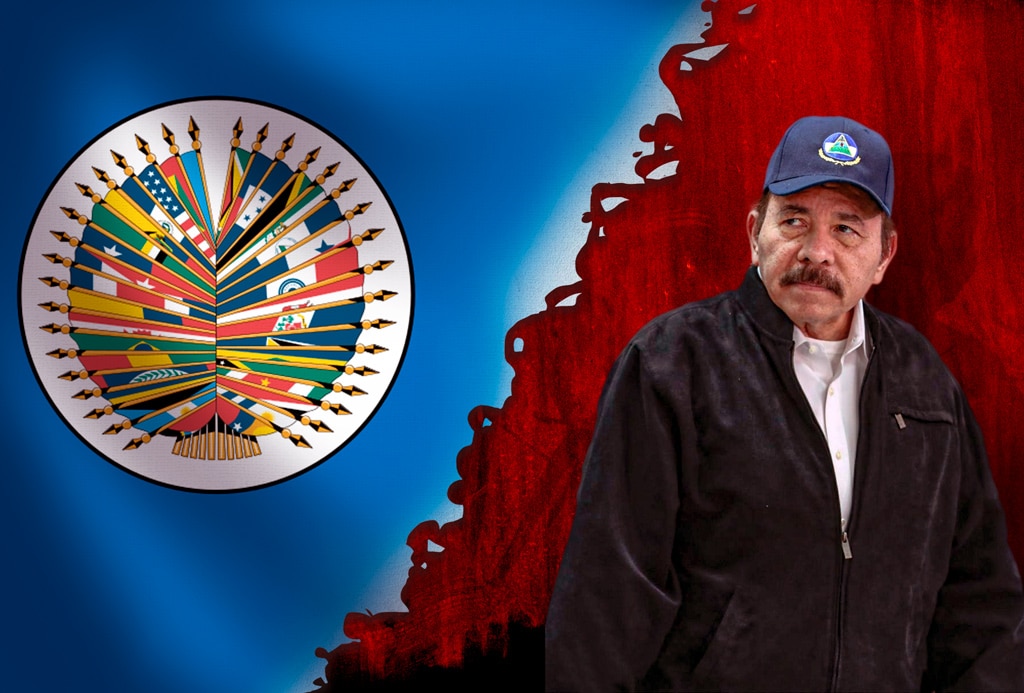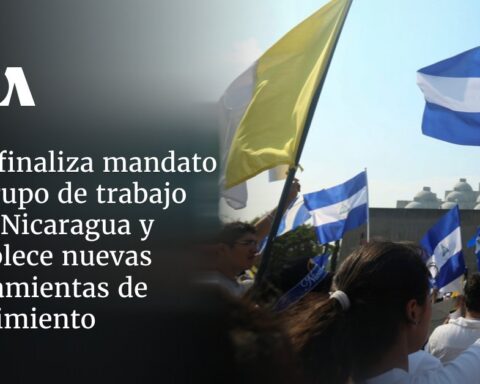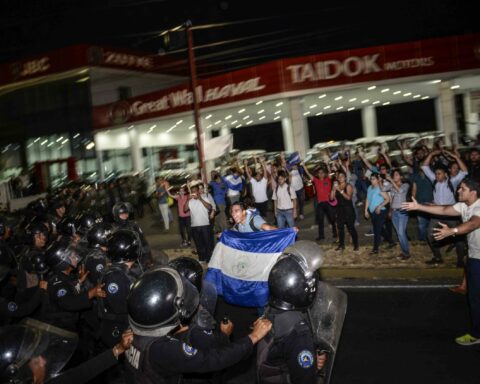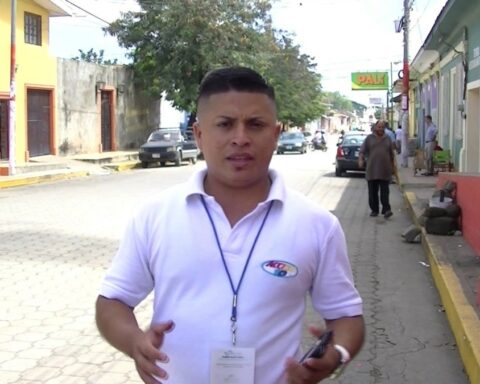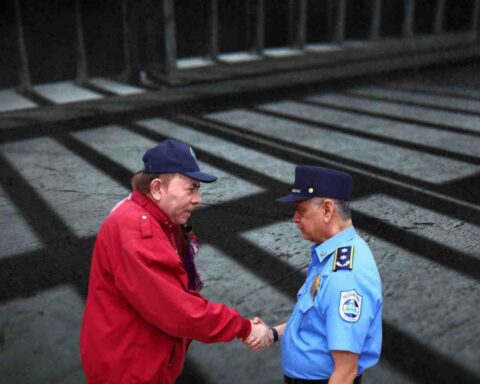The announced departure of Nicaragua from the Organization of American States (OAS) – a process that lasts two years – will not alter the script for the next meeting of the Permanent Council of the regional body, where a “collective appreciation” of the Nicaraguan crisis will be made. However, the regime’s decision, according to experts on international issues, will change the outcome of that meeting: States will have a free hand to convene an extraordinary assembly of foreign ministers, to determine whether to suspend Nicaragua.
At a press appearance, The chancellor Nicaraguan Denis Moncada Colindres reported on November 19 that, by order of President Daniel Ortega, he communicated to the Secretary General of the OAS, Luis Almagro, that Nicaragua denounced the Constitutional Charter of the organization, with which the link with the OAS was “terminated.”
Despite the fact that Nicaragua announced its departure from the body, it would be official and effective until November 2023, since the process lasts two years, for which they can suspend it before the end of that period. In addition, during this period, the Government must comply with all its political and financial obligations with the regional body.
The decision of the Ortega regime and his wife Rosario Murillo comes a week after a OAS General Assembly of Foreign Ministers approved – with 25 votes in favor, one against, seven abstentions and one absence – a resolution that declared that the Nicaraguan votes on November 7 “They were not free, fair or transparent and they do not have democratic legitimacy.”
At the same time, he instructed the OAS Permanent Council to carry out an “immediate collective assessment” of the situation in Nicaragua, in accordance with the OAS Charter and the Inter-American Democratic Charter, which must be completed “no later than November 30 “And” take appropriate action. “
There is still no definitive date for that meeting of the Permanent Council, but sources close to the OAS speak of Wednesday, November 24 – prior to the Thanksgiving vacation in the United States – or Monday, November 29.
Road to suspension and push to 24 votes
The experts commented that the collective appreciation does not translate into an automatic suspension of Nicaragua in the OAS, since the resolution of the General Assembly speaks of taking “the appropriate actions”. To do this, most likely was for countries to decide to opt for the “carrying out of diplomatic efforts”, which consists of creating a “commission of good offices” to visit the country and promote the “normalization of democratic institutions”, which is provided in Article 20 of the Democratic Charter.
However, according to experts, the announcement of the regime will strengthen the position of the countries that have requested take action against the Government of Ortega, and show the “undecided” that “Nicaragua is not going to cooperate and therefore there is no dialogue to keep.”
“(Nicaragua’s departure) makes it easier to get 24 votes to apply the suspension under Article 21 of the Inter-American Democratic Charter,” stressed one of the experts, who asked to omit his name for fear of reprisals.
Carlos Cascante Segura, professor at the School of International Relations of the National University (UNA), of Costa Rica, estimates that the regime has set up “the scenario to leave the OAS ”, but under“ the OAS interventionism letter ”and the alleged“ violation of national sovereignty ”.
In the letter sent to the OAS General Secretariat, the Nicaraguan Foreign Ministry indicates that his departure was a decision “sovereign and dignified by Nicaragua in the face of repeated interference by said hemispheric body in the internal affairs of our country.”
Collective evaluation will follow
The collective evaluation of Nicaragua will not stop because of the decision of the Ortega regime. This will be based primarily on an “updated” report from the OAS Secretary General, who last week he suggested “canceling” the Nicaraguan elections, in which Ortega and Murillo were re-elected to the Presidency.
The experts explained that, given the regime’s refusal to allow the entry of OAS officials, the countries have to resort to available sources, including the reports of the General Secretariat, the Inter-American Commission on Human Rights (IACHR) , diplomatic reports and journalistic information.
“The possibility of sending a small team to Nicaragua that could speak with different parties was considered, but there was no response from the government, which is the one who has to authorize the visit,” said a source close to the OAS.
Cascante pointed out that Collective evaluation “is not a technical term, but rather a political one,” so countries “can use all the available evidence.”
The last collective assessment of the OAS was on Venezuela, in March 2017. At that time, Almagro presented a report in which he stated: “The facts leave no room for doubt. Venezuela violates all the articles of the Inter-American Democratic Charter, ”according to the regional body’s website.
A month after the collective appreciation, in April 2017, Venezuelan President Nicolás Maduro denounced the Charter of the OAS to remove Venezuela. However, the process was not completed because a re-election of Maduro was unknown by the regional body, and instead they recognized as interim president Juan Guaidó, then president of Parliament, who appointed a new representative.
Reports on Daniel Ortega
In the Nicaraguan case, Almagro published, on November 9, a report prepared by the OAS Secretariat for Strengthening Democracy, which proposes to the international community to “demand the annulment” of the Nicaraguan votes “and to call to the celebration of a new electoral process ”.
They mentioned the efforts made by the OAS to return Nicaragua to the democratic channel, which were ignored by Ortega, among them a Memorandum of Understanding that included an electoral reform, which in the end ended up rendered insubstantial. In addition, They detailed the lack of independence of the Electoral Power, the repression that has been expressed in the detention of opposition candidates, the cancellation of party status and attacks on civil society and freedom of expression.
“Nicaragua was not in a position to hold elections with the minimum guarantees of a free, fair and transparent electoral process, and in fact renounced its international commitments in matters of democracy and the protection and defense of human rights,” the analysis states. of the OAS.
This report, according to experts on international issues, “will be updated” and presented to the Permanent Council during the collective assessment of Nicaragua.
Another report that would be taken into account and “updated”, according to the experts, is one of the Inter-American Commission on Human Rights (IACHR) —published on October 28— in which it was concluded that the November 7 elections sought “Perpetuate President Daniel Ortega in power”.

The roads in the OAS: suspension or exit
Nicaragua has two paths in the OAS that will lead it to the same destination: to remain outside the regional body. Both are covered at different times: the suspension is “immediate”, while the request to leave lasts two years.
The suspension
The process of suspension of a State is contemplated in Articles 20 and 21 of the Inter-American Democratic Charter.
Article 20 It establishes that the Permanent Council, depending on the situation, may order the necessary diplomatic efforts, including good offices, to promote the normalization of democratic institutions.
If diplomatic efforts prove unsuccessful or if the urgency of the case so advises, the Permanent Council shall immediately convene a special session of the General Assembly.
Article 21 details that, when the General Assembly, convened for a special session, finds that there has been a breakdown of the democratic order in a member state, it will make the decision to suspend said state from the exercise of its right to participate in the OAS with the affirmative vote of two thirds of the Member States – 24 votes out of 34. Suspension shall take effect immediately.
Voluntary departure from a country is contemplated in Article 143 of the Charter of the Organization or Constitutive of the OAS. This states that “The Charter will govern indefinitely, but it may be denounced by any of the member states, by means of a written communication to the General Secretariat, which will communicate in each case to the others the notification of denunciation that it receives.”
“After two years from the date on which the General Secretariat receives a notification of denunciation, this Letter will cease to have effect with respect to the complaining State, and the latter will be separated from the Organization after having complied with the obligations emanating from the present Letter “, specifies the article.
The exit
Regarding the departure of a member state, the same Charter of the Organization of the OAS establishes in its article 143 that the Charter “shall govern indefinitely, but it may be denounced by any of the member states, by means of a written communication to the General Secretariat,” as the Daniel Ortega regime has done.
In that case, the article continues, “after two years from the date on which the General Secretariat receives a notification of denunciation, this Letter will cease to have effect with respect to the complaining State, and the latter will be separated from the Organization after having fulfilled the obligations emanating from this Charter ”.

